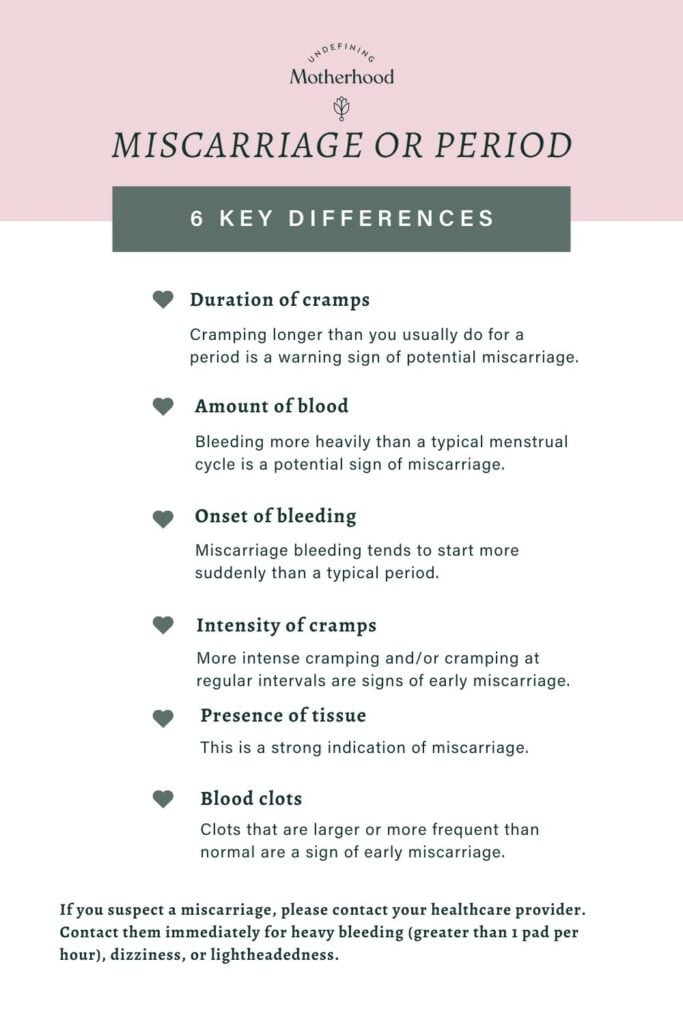You know that feeling when you’re trying to conceive–your period is due any day now, and you wipe and see blood. Maybe it’s heavier than usual, or it has bigger clots. Maybe the cramping feels stronger, or you’re a few days late and were really hoping for a positive pregnancy test. I’ve been there, friend, many times, and I understand how confusing and devastating it can be to see that bright red and wonder, is this a miscarriage, or a period? We’re here for you, friend, to help you understand the difference as best as possible.
Not knowing what’s happening with your body can be both harmful and frustrating. As a researcher, a recurrent miscarriage mama, and someone who’s facilitated a community of loss moms, I’m here to help.
While the best way to find out if you’re having an early miscarriage or a period is to see your doctor, I’ll tell you what you need to know while you’re waiting for your appointment. Hang in there, friend. We’ll figure this out together.

This site contains affiliate links, meaning that we earn a small commission for purchases made through our site. We only recommend products we personally use, love, or have thoroughly vetted.
Why is Knowing the Difference Between a Miscarriage and A Period so Hard?
Because losing a pregnancy has the same symptoms of your monthly menstrual cycle, namely bleeding and abdominal cramping, it can be really difficult to distinguish between the two if you have an early loss.
Early signs of miscarriage, as frustrating as this is (and trust me, I’ve been there!), look much like a period. We often hear that a miscarriage is “like a heavy period.” And if you lose a pregnancy within about a week of your expected period, this can be true (though it isn’t necessarily).
Here’s the deal, though: there are many different types of miscarriage. If you are trying to differentiate between a menstrual period and a miscarriage, if you are having a miscarriage, this would be a very early loss. Very early losses (within the first 5 weeks) are often called a “chemical pregnancies.”
While “chemical pregnancy” sounds very clinical (we hate it, honestly), this is a phrase that refers to a miscarriage that occurs before a pregnancy would visible on an ultrasound.
Period vs Miscarriage: Which Is It?
With a very early loss, it’s really easy to feel unsure if you’re experiencing a miscarriage or a period. Here are a few things to look for to help you distinguish between the two.

- Duration of cramps: Many of us who practice ovulation tracking know how long our period normally lasts; count the number of days and see if anything seems abnormal.
- Amount of blood: Are you bleeding more than you normally do during a typical menstrual cycle? If the bleeding is significantly heavier, an early miscarriage is possible.
- Onset of bleeding: Did your period start much more suddenly than usual? This can be a sign of a “miscarriage period.”
- Intensity of cramps: Is your period normally this intense? Do your cramps feel more severe, or do they occur at regular intervals? These could be signs of an early miscarriage.
- Presence of tissue: When you experience pregnancy loss, even early, you’ll likely pass some tissue. Passing tissue is a definite sign that this may be more than your usual period.
- Blood clots: Some people pass clots during their period, but if you don’t, and you start passing clots, it could definitely be a sign of an early miscarriage. Pay attention to whether you pass clots and whether they’re larger/more frequent than normal.
Even with all this knowledge in hand, you probably want to KNOW what’s happening to your body.
The best way to determine if you’re experiencing a heavy period or an early miscarriage is to see your doctor for a pregnancy test. You’ll want to get a blood test, as these particular pregnancy tests can detect very small amounts of the hCG hormone (aka the pregnancy hormone) in your bloodstream.
If you don’t have access to your doctor or want to know without leaving home, you can also take a pregnancy test at home and then go to the doctor. However, it’s possible that you might end up with a false negative because the urine test is less accurate in early pregnancy than a blood test.
Whether you use a blood or urine test, a positive pregnancy test with bleeding is a sure sign of an early miscarriage (rather than a period).
What Does Miscarriage Tissue Look Like?
I can’t tell you how often people send me private messages asking what miscarriage clots look like.
They want to see tissue or miscarriage blood clot pictures, and they often want to know the difference between miscarriage and period clots.
When you pass tissue during an early loss, it’s likely that you’re passing the gestational sac (the cavity of fluid surrounding the embryo), which is often coated in dark blood, but when cleaner, may be clearer or translucent in color.
Many people have told me that a gestational sac is especially dense compared to their normal period blood clots.
I’m not going to include any photos in this article, as they’re very graphic and, having experienced multiple losses, I personally find them triggering. I do not want to traumatize any of our readers.
Many of our community members have been so generous, however, as to share photos of their losses for the benefit of struggling women looking for photos.
Disclaimer:
Please know that these pictures may be disturbing, that they are for informational purposes only and that no liability is assumed.
By choosing to download and view this document, you are responsible for your choices, actions, and results taken by viewing these photos.
If, at any time, you find these photos to be distressing, anxiety provoking, or otherwise causing physical or emotional difficulties, please stop use immediately and contact a qualified health or mental health professional.
When Should You Call Your Doctor about a Miscarriage vs Period?
Personally, I recommend contacting your healthcare provider if you even suspect a miscarriage.
They can test your blood or urine to confirm pregnancy. And, importantly, they can monitor you to make sure everything goes as smoothly as possible and that no later complications, such as infection, arise.
If you choose not to contact your doctor “in case” it’s a heavy period, please DO contact them if you experience symptoms like heavy bleeding, passing clots or tissue, dizziness, or lightheadedness.
If you are bleeding through a menstrual pad per hour (or more), please go to the nearest emergency room immediately.
Remember that I am not a medical doctor, and this informative information does not replace medical advice. I ALWAYS advise seeing your doctor if you even suspect a possible miscarriage.

Takeaways: Early Miscarriage vs Period
Distinguishing between a heavy period and an early miscarriage isn’t always as straightforward as we’d like it to be. But, there are still many ways to to tell if you’re having an early loss:
- heavy bleeding that occurs at the same time as uterine cramps,
- passing blood clots or tissue, and
- cramping that is heavier than normal or occurs at specific intervals.
I always recommend contacting your doctor to be sure. If you don’t feel like you can contact your doctor over the possibility of an early loss, I suggest finding a new, more caring doctor.
Regardless of how early your pregnancy loss happens, such losses can still be gut wrenching. If you’re grieving this type of loss, please know that your grief is valid.

We’re here to support you through coping with miscarriage grief, figuring out how to deal with miscarriage, and even finding healing through a miscarriage memorial.
Tell us your story. How can we help you next?










